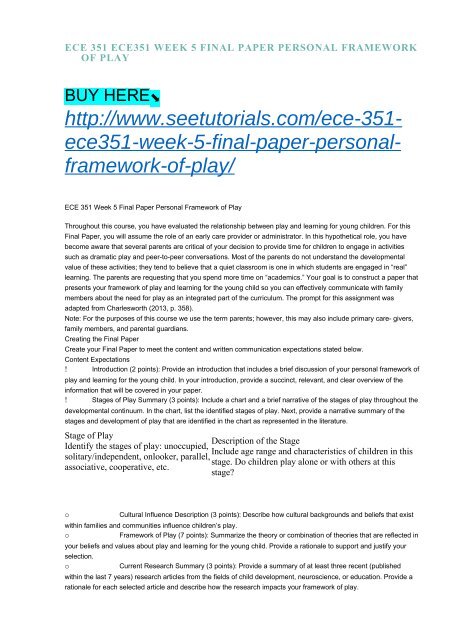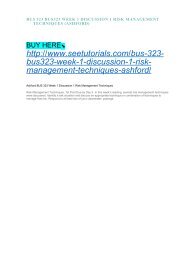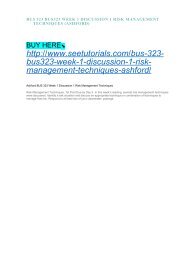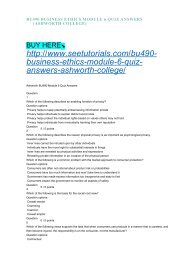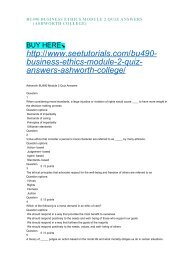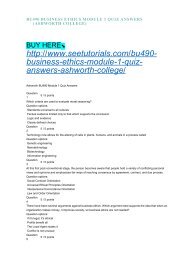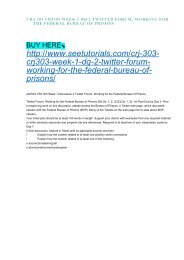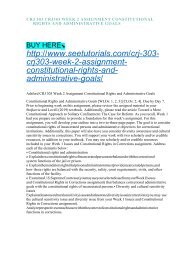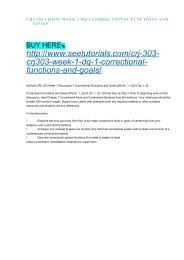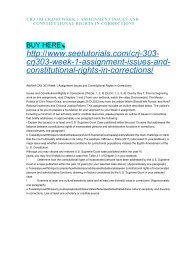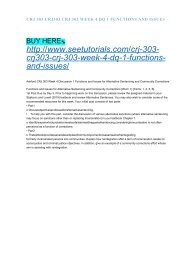ECE 351 ECE351 WEEK 5 FINAL PAPER PERSONAL FRAMEWORK OF PLAY
You also want an ePaper? Increase the reach of your titles
YUMPU automatically turns print PDFs into web optimized ePapers that Google loves.
<strong>ECE</strong> <strong>351</strong> <strong>ECE</strong><strong>351</strong> <strong>WEEK</strong> 5 <strong>FINAL</strong> <strong>PAPER</strong> <strong>PERSONAL</strong> <strong>FRAMEWORK</strong><br />
<strong>OF</strong> <strong>PLAY</strong><br />
BUY HERE⬊<br />
http://www.seetutorials.com/ece-<strong>351</strong>-<br />
ece<strong>351</strong>-week-5-final-paper-personalframework-of-play/<br />
<strong>ECE</strong> <strong>351</strong> Week 5 Final Paper Personal Framework of Play<br />
Throughout this course, you have evaluated the relationship between play and learning for young children. For this<br />
Final Paper, you will assume the role of an early care provider or administrator. In this hypothetical role, you have<br />
become aware that several parents are critical of your decision to provide time for children to engage in activities<br />
such as dramatic play and peer-to-peer conversations. Most of the parents do not understand the developmental<br />
value of these activities; they tend to believe that a quiet classroom is one in which students are engaged in “real”<br />
learning. The parents are requesting that you spend more time on “academics.” Your goal is to construct a paper that<br />
presents your framework of play and learning for the young child so you can effectively communicate with family<br />
members about the need for play as an integrated part of the curriculum. The prompt for this assignment was<br />
adapted from Charlesworth (2013, p. 358).<br />
Note: For the purposes of this course we use the term parents; however, this may also include primary care- givers,<br />
family members, and parental guardians.<br />
Creating the Final Paper<br />
Create your Final Paper to meet the content and written communication expectations stated below.<br />
Content Expectations<br />
Introduction (2 points): Provide an introduction that includes a brief discussion of your personal framework of<br />
play and learning for the young child. In your introduction, provide a succinct, relevant, and clear overview of the<br />
information that will be covered in your paper.<br />
Stages of Play Summary (3 points): Include a chart and a brief narrative of the stages of play throughout the<br />
developmental continuum. In the chart, list the identified stages of play. Next, provide a narrative summary of the<br />
stages and development of play that are identified in the chart as represented in the literature.<br />
Stage of Play<br />
Identify the stages of play: unoccupied,<br />
solitary/independent, onlooker, parallel,<br />
associative, cooperative, etc.<br />
Description of the Stage<br />
Include age range and characteristics of children in this<br />
stage. Do children play alone or with others at this<br />
stage?<br />
o<br />
Cultural Influence Description (3 points): Describe how cultural backgrounds and beliefs that exist<br />
within families and communities influence children’s play.<br />
o<br />
Framework of Play (7 points): Summarize the theory or combination of theories that are reflected in<br />
your beliefs and values about play and learning for the young child. Provide a rationale to support and justify your<br />
selection.<br />
o<br />
Current Research Summary (3 points): Provide a summary of at least three recent (published<br />
within the last 7 years) research articles from the fields of child development, neuroscience, or education. Provide a<br />
rationale for each selected article and describe how the research impacts your framework of play.
o<br />
Challenges to Play (2 points): Describe an issue that challenges the opportunities for children to<br />
participate in and learn from play (e.g., barriers to the learning environment that limit the ability to play or challenges<br />
associated with a lack of community recreational areas). Provide a rationale, and suggestions for reducing the impact<br />
of your selected issue.<br />
o<br />
Authentic Exemplar Activity (5 points): Describe an activity that will serve as an example for<br />
families about the importance of play and state why you think this activity will increase a families understanding of the<br />
role of play in healthy child growth and development. Please note: You are required to include a description of an<br />
activity; you are not required to include a lesson plan.<br />
o For example, during symbolic or dramatic play, children like to make up their own stories. In an effort to promote<br />
this type of play, parents can supply children with pots, pans, and other kitchen supplies to explore the idea of<br />
symbolic representation. When children use kitchen utensils for drums, hats, and other non-intended purposes, they<br />
increase their understanding that one thing can stand for another. Studies show that this type of symbolic play can<br />
increase cognitive skills such as complex abstract reasoning and linguistic competence.


